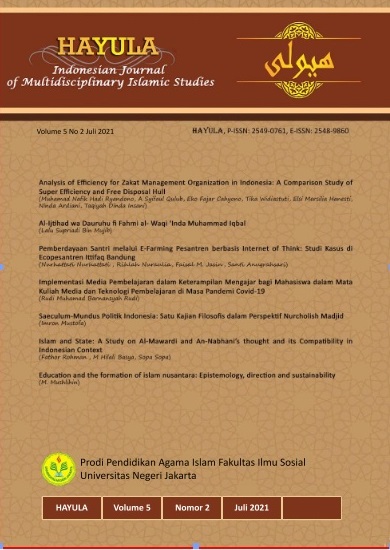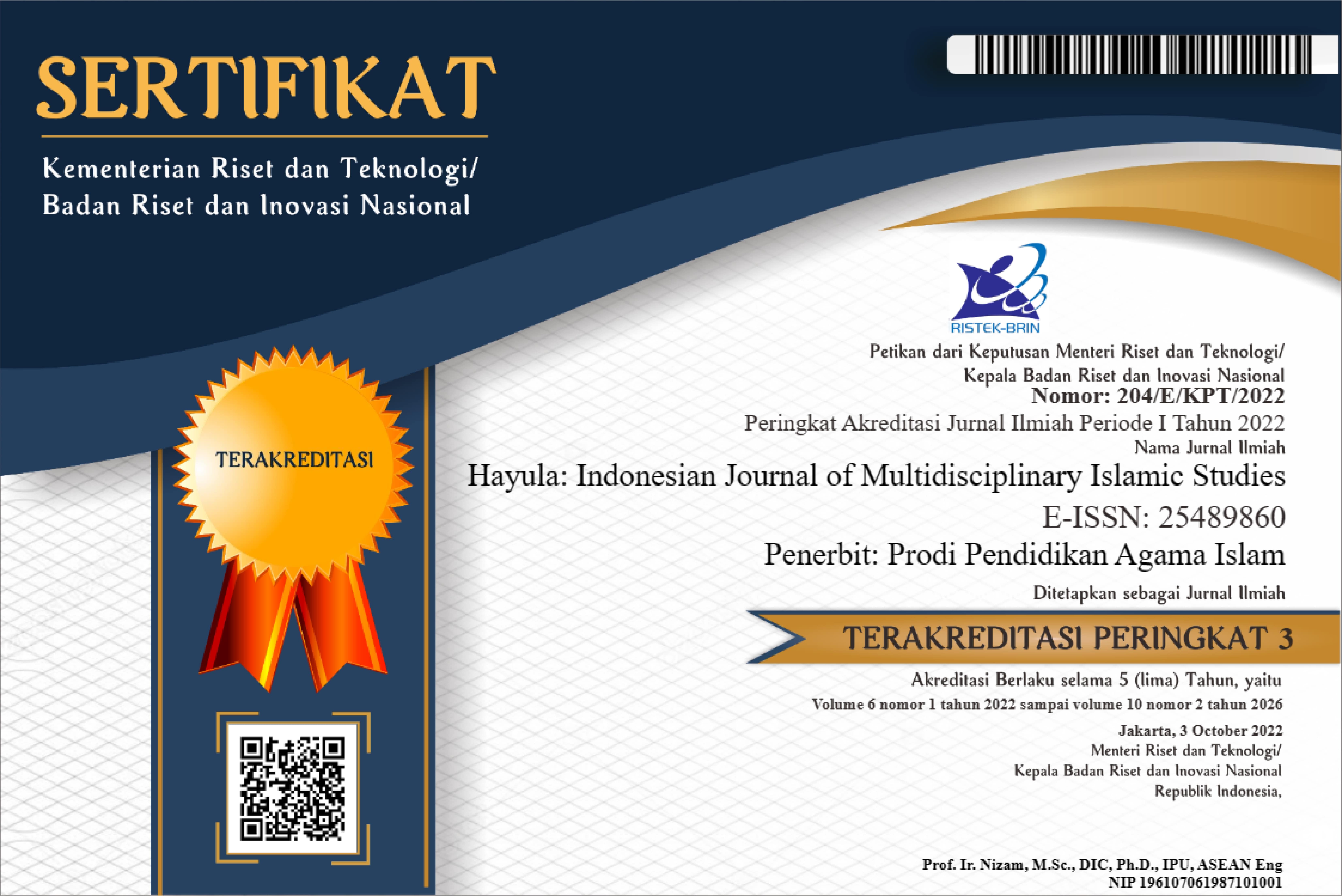Saeculum-Mundus Politik Indonesia: Satu Kajian Filosofis dalam Perspektif Nurcholish Madjid
DOI:
https://doi.org/10.21009/005.02.05Keywords:
Authoritarianism, Integrity, Logic of science, Madjid, Principle of identityAbstract
This article suggests some common opinions on Muslim’s worldview, which became the center of contention. This gives rise to perspective which states that the religion participation in government will bring the world of politics into the arena of theo-centrism that ends in authoritarianism. The research is qualitative, based on library research. The approach used is descriptive critical analysis. It aims to describe factual dynamics on Indonesian social-politic from philosophical point of view. The research finds that, on the second half of twentieth century, Nurcholish Madjid’s renewal idea on Islamic political thought (secularization) gets a variety of responses. Madjid suggested the need to separate religion from social-politic arena with his slogan, ‘Islam Yes, Islamic party No’. The basis of the idea is built on the concept of rationality as the main authority in the social science paradigm. Ideas or dogma, meanwhile, is part of historical development which has to be submissive to conditions that always change. Everything that “exist” has to change, the only absolute one is the change itself.
References
Akmal, A. (2019). The Rise of #IndonesiaTanpaJIL Youth Movement and the Fall of Liberal Islam on Cyberspace. Tsaqafah: Jurnal Peradaban Islam, 15(2), 363-374.
al-Attas, S. M. (1995). Prolegomena to The Metaphysics of Islam An Exposition of the Fundamental Element of the Worldview of Islam. Kuala Lumpur: ISTAC.
Al-Hujwiri, ‘. I. (t.t.). Kashf aI-Maḥjūb. Lahore: Islamic Book Foundation.
al-Jabiri, A. (2004). Bunyah al-'Aql al-'Arabī. Bayrūt: Markaz Dirāsah al-Wahdah al-'Arabīyah.
Asad, M. (1983). Islam di Simpang Jalan. Bandung: t.p.
Asyaukani, L. (3 September 2005). Kompas. Kompas.
Atmaja, A. K. (2020, July 29). Pluralisme Nurcholis Madjid dan Relevansinya terhadap Problem Dakwah Kontemporer. Jurnal Dakwah Risalah, 31(1). Retrieved July 29, 2021
Cox, H. (1967). The Secular City: Secularization and Urbanization in Theological Perspective. New York: The Macmillan Company.
Esposito, J. L., Tamimi, A., Keane, J., Elmassiri, A. W., Elmassiri, A., Manzoor, S. P., . . . Davutoglu, A. (2000). Islam and Secularism in the Middle East. (J. L. Esposito, & A. ETamimi, Eds.) New York: New York University Press.
Fautanu, I., M., B., & Gunawan, H. (2020). Politik Identitas dalam Pilkada DKI Jakarta Tahun 2017: Perspektif Pemikiran Politik Nurcholish Madjid. Politicon: Jurnal Ilmu Politik, 2 (2).
Grose, G. B., & Hubbard, B. J. (1999). Tiga Agama Satu Tuhan. Bandung: Mizan.
Hassan, M. K. (1982). Muslim Intellectual Responses to “New Order Modernization in Indonesia. Kuala Lumpur: Dewan Bahasa dan Pustaka.
Kurzman, C. (Ed.). (2003). Wacana Islam. Jakarta: Paramadina.
Madjid, N. (1970). Keharusan Pembaruan Pemikiran Islam dan Masalah Integrasi Umat. T.tp.: t.p.
Madjid, N. (1987). Islam Kemodernan dan Keindonesiaan. Bandung: Mizan.
Madjid, N. (1993). Beberapa Renungan tentang Kehidupan Keagamaan untuk Generasi Mendatang. Jurnal Ilmu dan Kebudayaan Ulumul Qur’an, 4(1), 24-25.
Madjid, N. (1995). Islam Doktrin dan Peradaban. Jakarta: Paramadina.
Madjid, N. (2000). Membangun Oposisi Menjaga Momentum Demokrasi. Jakarta: Voice Center Indonesia.
Madjid, N. (2004). Pijakan Keimanan Bagi Fiqih Lintas Agama. (M. A. Sirry, Ed.) Jakarta: Paramadina.
Magee, B. (t.t.). The Story of Philosophy. London: DK Publishing.
Mustofa, I. (2017, Juni). Fisika Atom sebagai Basis Filosofis Ilmu dalam Perspektif al-Ghazali. Epistemé: Jurnal Pengembangan Ilmu Keislaman, 12(1), 53-75.
Mustofa, I. (2019). Gagasan Islamisasi Ilmu (Studi tentang Kerangka Metodologi Institute for the Study of Islamic Thought and Civilization (INSISTS)). Surabaya: Disertasi--UIN Sunan Ampel.
Nasution, H. (1997). Islam, Sekularisasi dan Sekularisme: Catatan atas Pemikiran Pembaruan Nurcholish Madjid. In H. Nasution, Islam Rasional (p. 189). Bandung: Mizan.
Pardoyo. (1993). Sekularisasi dalam Polemik. Jakarta: Grafiti.
Popkin, R. H. (1967). The Encyclopedia of Philosophy (Vol. 7). (P. Edwards, Ed.) NewYork: Macmillan.
Popper, K. R. (1965). Logic of Scientific Discovery. New York: Harper and Row, Harper Torchbooks.
Rachman, B. M. (2006). Nurcholish Madjid dan Perdebatan Islam di Indonesia, dalam Menembus Batas Tradisi, Menuju Masa Depan yang Membebaskan: Refleksi atas Pemikiran Nurcholish Madjid. Jakarta: Kompas.
Rahman, F. (1984). Islam and Modernity, Transformation of an Intellectual Tradition . London: The University of Chicago Press.
Rorty, R. (1980). Richard Rorty, Philosophy and The Mirror of Nature. Richard Rorty, Philosophy and The Mirror of NaturePrinceton: Princeton University Press.
Rosyid, D. (1993). Pembaruan Islam dan Orientalisme dalam Sorotan. Jakarta: Usamah Press.
Runzo, J. (1986). Reason, Relativism and God. London: Macmillah Press.
Smart, N. (t.t.). Worldview, Crosscultural Explorations of Human Belief. New York: Charles Sribner's sons.
Stodard, L. (t.t.). Ḥāḍir al-‘Ālam al-Islāmī (Vol. 1). Bayrut: Dār al-Fikr.
Taryadi, A. (1991). Epistemologi Pemecahan Masalah Menurut Karl Popper. Jakarta: Gramedia.
The Encyclopedia of Religion. (1995). In M. Eliade. New York: Simon dan Schuster.
Titus, H. H., Smith, M. S., & T., . (1984). Persoalan-persoalan Filsafat. Jakarta: Bulan Bintang.
Veeger, K. J. (1993). Realitas Sosial Refleksi Filsafat Sosial Atas Hubungan Individu-Masyarakat dalam Cakrawala Sejarah Sosiologi. Jakarta: Gramedia.
Downloads
Published
How to Cite
Issue
Section
License
Authors who publish with this Journal agree to the following terms:
- Author retain copyright and grant the journal right of first publication with the work simultaneously licensed under a creative commons attribution licensethat allow others to share the work within an acknowledgement of the work’s authorship and initial publication of this journal.
- Authors are able to enter into separate, additional contractual arrangementfor the non-exclusive distribution of the journal’s published version of the work (e.g. acknowledgement of its initial publication in this journal).
- Authors are permitted and encouraged to post their work online(e.g. in institutional repositories or on their websites) prior to and during the submission process, as it can lead to productive exchanges, as well as earlier and greater citation of published works.
Users/public use of this website will be licensed to CC BY







